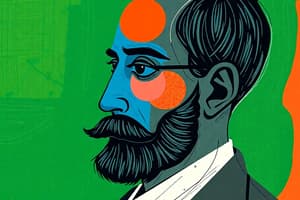Podcast
Questions and Answers
Who rejected introspection and emphasized objective measurement?
Who rejected introspection and emphasized objective measurement?
- Carl Rogers
- Martin Seligman
- Sigmund Freud
- Skinner (correct)
What was the main focus of Psychoanalysis?
What was the main focus of Psychoanalysis?
- The neural basis of behavior
- The role of adaptation in human behavior
- The role of the unconscious in shaping behavior (correct)
- The importance of self-actualization
Who led the development of Humanistic Psychology?
Who led the development of Humanistic Psychology?
- Carl Rogers and Abraham Maslow (correct)
- Roger Sperry and David Hubel
- Ulric Neisser and Jerome Bruner
- Sigmund Freud and Carl Jung
What was the main focus of Cognitive Psychology?
What was the main focus of Cognitive Psychology?
Who led the development of Biological Psychology?
Who led the development of Biological Psychology?
What was the main focus of Evolutionary Psychology?
What was the main focus of Evolutionary Psychology?
Who led the development of Positive Psychology?
Who led the development of Positive Psychology?
What is the focus of Neuroscience and Neuroimaging?
What is the focus of Neuroscience and Neuroimaging?
Who established the first psychology laboratory in Leipzig, Germany?
Who established the first psychology laboratory in Leipzig, Germany?
Which of the following approaches focused on breaking down mental processes into component parts?
Which of the following approaches focused on breaking down mental processes into component parts?
Who led the functionalism approach in psychology?
Who led the functionalism approach in psychology?
Which approach focused on the role of environment and adaptation?
Which approach focused on the role of environment and adaptation?
Who are the philosophers mentioned in the early beginnings of psychology?
Who are the philosophers mentioned in the early beginnings of psychology?
Which approach in psychology focused on breaking down mental processes into component parts?
Which approach in psychology focused on breaking down mental processes into component parts?
Who established the first psychology laboratory in Leipzig, Germany?
Who established the first psychology laboratory in Leipzig, Germany?
What was the main focus of Structuralism?
What was the main focus of Structuralism?
Which philosopher's ideas influenced the development of Structuralism?
Which philosopher's ideas influenced the development of Structuralism?
What was the goal of Structuralism?
What was the goal of Structuralism?
Flashcards are hidden until you start studying
Study Notes
Early Beginnings
- Ancient Greeks: Philosophers like Plato and Aristotle explored the human mind and behavior
- 17th-18th centuries: René Descartes and John Locke laid the groundwork for modern psychology
- 19th century: Wilhelm Wundt established the first psychology laboratory in Leipzig, Germany (1879)
Structuralism and Functionalism
- Structuralism ( late 19th century):
- Focus on breaking down mental processes into component parts
- Led by Wilhelm Wundt and Edward Titchener
- Emphasized introspection and self-reporting
- Functionalism (early 20th century):
- Focus on the function and purpose of consciousness
- Led by William James and John Dewey
- Emphasized the role of environment and adaptation
Early 20th Century
- Behaviorism (early 20th century):
- Focus on observable behavior and environmental influences
- Led by John B. Watson and B.F. Skinner
- Rejected introspection and emphasized objective measurement
- Psychoanalysis (early 20th century):
- Focus on the unconscious mind and childhood experiences
- Developed by Sigmund Freud
- Emphasized the role of the unconscious in shaping behavior
Mid-20th Century
- Humanistic Psychology (mid-20th century):
- Focus on human dignity, self-actualization, and personal growth
- Led by Carl Rogers and Abraham Maslow
- Emphasized the importance of subjective experience and human potential
- Cognitive Psychology (mid-20th century):
- Focus on mental processes like perception, attention, and memory
- Led by Ulric Neisser and Jerome Bruner
- Emphasized the role of information processing and mental representation
Late 20th Century and Beyond
- Biological Psychology (late 20th century):
- Focus on the neural basis of behavior and mental processes
- Led by researchers like Roger Sperry and David Hubel
- Emphasized the importance of neuroimaging and neurophysiology
- Evolutionary Psychology (late 20th century):
- Focus on the evolutionary origins of human behavior and mental processes
- Led by researchers like David Buss and Robert Trivers
- Emphasized the role of adaptation and natural selection in shaping human behavior
Contemporary Developments
- Positive Psychology (late 20th century):
- Focus on promoting mental well-being and happiness
- Led by researchers like Martin Seligman and Chris Peterson
- Emphasized the importance of positive emotions and strengths
- Neuroscience and Neuroimaging (late 20th century):
- Focus on understanding the neural basis of behavior and mental processes
- Led by researchers like Francis Crick and Eric Kandel
- Emphasized the importance of neuroimaging and neurophysiology in understanding human behavior
Early Beginnings
- Ancient Greeks, such as Plato and Aristotle, explored the human mind and behavior
- René Descartes and John Locke laid the groundwork for modern psychology in the 17th-18th centuries
- Wilhelm Wundt established the first psychology laboratory in Leipzig, Germany in 1879
Structuralism and Functionalism
- Structuralism focused on breaking down mental processes into component parts, led by Wilhelm Wundt and Edward Titchener
- Structuralism emphasized introspection and self-reporting in the late 19th century
- Functionalism focused on the function and purpose of consciousness, led by William James and John Dewey
- Functionalism emphasized the role of environment and adaptation in the early 20th century
Early 20th Century
- Behaviorism focused on observable behavior and environmental influences, led by John B. Watson and B.F. Skinner
- Behaviorism rejected introspection and emphasized objective measurement in the early 20th century
- Psychoanalysis focused on the unconscious mind and childhood experiences, developed by Sigmund Freud
- Psychoanalysis emphasized the role of the unconscious in shaping behavior in the early 20th century
Mid-20th Century
- Humanistic Psychology focused on human dignity, self-actualization, and personal growth, led by Carl Rogers and Abraham Maslow
- Humanistic Psychology emphasized the importance of subjective experience and human potential in the mid-20th century
- Cognitive Psychology focused on mental processes like perception, attention, and memory, led by Ulric Neisser and Jerome Bruner
- Cognitive Psychology emphasized the role of information processing and mental representation in the mid-20th century
Late 20th Century and Beyond
- Biological Psychology focused on the neural basis of behavior and mental processes, led by researchers like Roger Sperry and David Hubel
- Biological Psychology emphasized the importance of neuroimaging and neurophysiology in the late 20th century
- Evolutionary Psychology focused on the evolutionary origins of human behavior and mental processes, led by researchers like David Buss and Robert Trivers
- Evolutionary Psychology emphasized the role of adaptation and natural selection in shaping human behavior in the late 20th century
Contemporary Developments
- Positive Psychology focused on promoting mental well-being and happiness, led by researchers like Martin Seligman and Chris Peterson
- Positive Psychology emphasized the importance of positive emotions and strengths in the late 20th century
- Neuroscience and Neuroimaging focused on understanding the neural basis of behavior and mental processes, led by researchers like Francis Crick and Eric Kandel
- Neuroscience and Neuroimaging emphasized the importance of neuroimaging and neurophysiology in understanding human behavior in the late 20th century
Early Beginnings
- Ancient Greeks, specifically philosophers Plato and Aristotle, explored the human mind and behavior
- René Descartes and John Locke laid the groundwork for modern psychology in the 17th-18th centuries
- Wilhelm Wundt established the first psychology laboratory in Leipzig, Germany in 1879
Structuralism and Functionalism
- Structuralism (late 19th century) focused on breaking down mental processes into component parts
- Led by Wilhelm Wundt and Edward Titchener, it emphasized introspection and self-reporting
- Functionalism (early 20th century) focused on the function and purpose of consciousness
- Led by William James and John Dewey, it emphasized the role of environment and adaptation
Early 20th Century
- Behaviorism (early 20th century) focused on observable behavior and environmental influences
- Led by John B. Watson and B.F. Skinner, it rejected introspection and emphasized objective measurement
Mid-20th Century
- Psychoanalysis (early 20th century) focused on the unconscious mind and childhood experiences
- Developed by Sigmund Freud, it emphasized the role of the unconscious in shaping behavior
- Humanistic Psychology (mid-20th century) focused on human dignity, self-actualization, and personal growth
- Led by Carl Rogers and Abraham Maslow, it emphasized the importance of subjective experience and human potential
- Cognitive Psychology (mid-20th century) focused on mental processes like perception, attention, and memory
- Led by Ulric Neisser and Jerome Bruner, it emphasized the role of information processing and mental representation
Late 20th Century and Beyond
- Biological Psychology (late 20th century) focused on the neural basis of behavior and mental processes
- Led by researchers like Roger Sperry and David Hubel, it emphasized the importance of neuroimaging and neurophysiology
- Evolutionary Psychology (late 20th century) focused on the evolutionary origins of human behavior and mental processes
- Led by researchers like David Buss and Robert Trivers, it emphasized the role of adaptation and natural selection in shaping human behavior
Contemporary Developments
- Positive Psychology (late 20th century) focused on promoting mental well-being and happiness
- Led by researchers like Martin Seligman and Chris Peterson, it emphasized the importance of positive emotions and strengths
- Neuroscience and Neuroimaging (late 20th century) focused on understanding the neural basis of behavior and mental processes
- Led by researchers like Francis Crick and Eric Kandel, it emphasized the importance of neuroimaging and neurophysiology in understanding human behavior
Studying That Suits You
Use AI to generate personalized quizzes and flashcards to suit your learning preferences.




